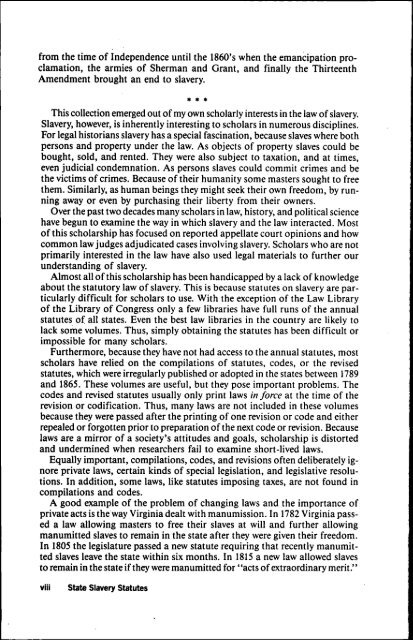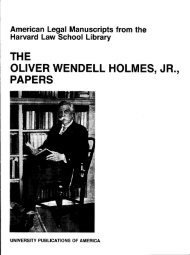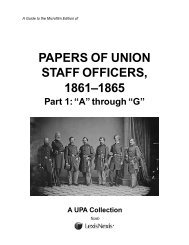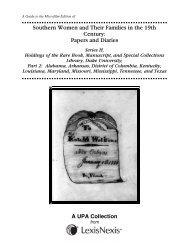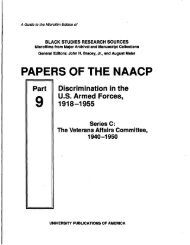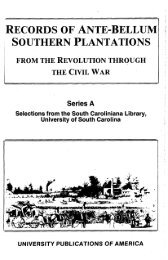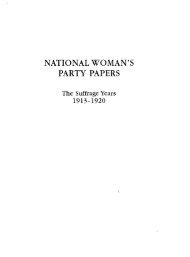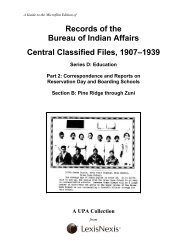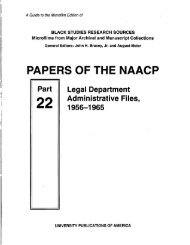- Page 1: TÄTE IAVERY TATUTES Guide to the M
- Page 4 and 5: UPA Academic Editions Staff Editor-
- Page 7: The Statute Laws of the Slave South
- Page 11 and 12: etween sixteen and fifty work on th
- Page 13: 9. Alabama Acts, 1837, 6. 10. Ibid.
- Page 16 and 17: Sample Entry: Bibliography of State
- Page 18 and 19: NOTE FROM THE PUBLISHER The editors
- Page 20 and 21: AL-1819 Bibliography of State Slave
- Page 22 and 23: ALI 824 Bibliography of State Slave
- Page 24 and 25: AL-1827 Bibliography of State Slave
- Page 26 and 27: ALI 830 Bibliography of State Slave
- Page 28 and 29: ALI 834 Bibliography of State Slave
- Page 30 and 31: ALI 837.11 Bibliography of State Sl
- Page 32 and 33: AL-1840 Bibliography of State Slave
- Page 34 and 35: ALI 842 Bibliography of State Slave
- Page 36 and 37: ALI 845 Bibliography of State Slave
- Page 38 and 39: AL-1849 Bibliography of State Slave
- Page 40 and 41: AL-1853 Bibliography of State Slave
- Page 42 and 43: ALI 857 Bibliography of State Slave
- Page 44 and 45: ALI 859 Bibliography of State Slave
- Page 46 and 47: AL-1863.11 Bibliography of State Sl
- Page 48 and 49: AR-1828 Bibliography of State Slave
- Page 50 and 51: AR-1844 Bibliography of State Slave
- Page 52 and 53: AR-1854 Bibliography of State Slave
- Page 54 and 55: AR-1864.4 AR-1864.4 Note: The Septe
- Page 56 and 57: DE-1812.1 Bibliography of State Sla
- Page 58 and 59:
DEI 821 Bibliography of State Slave
- Page 60 and 61:
DE-1825 Bibliography of State Slave
- Page 62 and 63:
DE-1827 Bibliography of State Slave
- Page 64 and 65:
DE-1833 Bibliography of State Slave
- Page 66 and 67:
DEI 851 Bibliography of State Slave
- Page 68 and 69:
DE-1861.1 Bibliography of State Sla
- Page 70 and 71:
FL-1824 Bibliography of State Slave
- Page 72 and 73:
FL-1829 Bibliography of State Slave
- Page 74 and 75:
FL-1836 Bibliography of State Slave
- Page 76 and 77:
FL-1845.6 Contains: • Constitutio
- Page 78 and 79:
FL-1854 Bibliography of State Slave
- Page 80 and 81:
FL-1862 Bibliography of State Slave
- Page 82 and 83:
GA-1797 Bibliography of State Slave
- Page 84 and 85:
GAI 804 Bibliography of State Slave
- Page 86 and 87:
GA-1811 • An Act to establish a t
- Page 88 and 89:
GAI 816 Bibliography of State Slave
- Page 90 and 91:
GA-1821.4 Bibliography of State Sla
- Page 92 and 93:
GAI 824 Bibliography of State Slave
- Page 94 and 95:
GA-1829 Bibliography of State Slave
- Page 96 and 97:
GAI 831 Bibliography of State Slave
- Page 98 and 99:
GAI 833 Bibliography of State Slave
- Page 100 and 101:
GA-1837 Bibliography of State Slave
- Page 102 and 103:
GAI 841 Bibliography of State Slave
- Page 104 and 105:
GAI 845 Bibliography of State Slave
- Page 106 and 107:
GAI 849 Bibliography of State Slave
- Page 108 and 109:
GA-1853 Bibliography of State Slave
- Page 110 and 111:
GA-1853 Bibliography of State Slave
- Page 112 and 113:
GAI 857 Bibliography of State Slave
- Page 114 and 115:
GA-1858 Bibliography of State Slave
- Page 116 and 117:
GAI 860 Bibliography of State Slave
- Page 118 and 119:
GAI 862 Bibliography of State Slave
- Page 120 and 121:
KY-1793 Bibliography of State Slave
- Page 122 and 123:
KY-1803 Bibliography of State Slave
- Page 124 and 125:
KY-1816 Bibliography of State Slave
- Page 126 and 127:
KY-1822 Bibliography of State Slave
- Page 128 and 129:
KY-1826 Bibliography of State Slave
- Page 130 and 131:
KY-1831 Bibliography of State Slave
- Page 132 and 133:
KY-1834 Bibliography of State Slave
- Page 134 and 135:
KY-1837 Bibliography of State Slave
- Page 136 and 137:
KY-1839 Bibliography of State Slave
- Page 138 and 139:
KY-1842 Bibliography of State Slave
- Page 140 and 141:
KY-1844 Bibliography of State Slave
- Page 142 and 143:
KY-1845 281• An Act for the benef
- Page 144 and 145:
KY-1846 Bibliography of State Slave
- Page 146 and 147:
KY-1847 Bibliography of State Slave
- Page 148 and 149:
KY-1848 Bibliography of State Slave
- Page 150 and 151:
KY-1850 548• An Act for the benef
- Page 152 and 153:
KYI 853 904• An Act for the benef
- Page 154 and 155:
KY-1859 1304• An Act concerning f
- Page 156 and 157:
KY-1862.8 Bibliography of State Sla
- Page 158 and 159:
KY-1865.12 Bibliography of State Sl
- Page 160 and 161:
LA-1808 Bibliography of State Slave
- Page 162 and 163:
LA-1814.1 • An Act supplementary
- Page 164 and 165:
LA-1820.1 • An Act for the relief
- Page 166 and 167:
LA-1826 Bibliography of State Slave
- Page 168 and 169:
LA-1832 person of color); Julien (f
- Page 170 and 171:
LA-1837.1 Bibliography of State Sla
- Page 172 and 173:
LA-1841.1 Bibliography of State Sla
- Page 174 and 175:
LA-184 5 Bibliography of State Slav
- Page 176 and 177:
LA-1848.1 Bibliography of State Sla
- Page 178 and 179:
LA-1852 Bibliography of State Slave
- Page 180 and 181:
LA-1854 Cuba; Emancipation; Impriso
- Page 182 and 183:
LA-1857 Bibliography of State Slave
- Page 184 and 185:
LA-1860.1 Bibliography of State Sla
- Page 186 and 187:
LA-1865.1 27• An Act relative to
- Page 188 and 189:
MD-1794 3• An Act for annulling t
- Page 190 and 191:
MD-1801 (negro); Long, Robert; Town
- Page 192 and 193:
MD-1810 3• An Act for the benefit
- Page 194 and 195:
MD-1816 Bibliography of State Slave
- Page 196 and 197:
MD-1819 Bibliography of State Slave
- Page 198 and 199:
MD-1821 Charles counties, passed De
- Page 200 and 201:
MD-1823 Bibliography of State Slave
- Page 202 and 203:
MD-1826 Bibliography of State Slave
- Page 204 and 205:
MD-1830 Bibliography of State Slave
- Page 206 and 207:
MD-1833 Bibliography of State Slave
- Page 208 and 209:
MD-1835 Bibliography of State Slave
- Page 210 and 211:
MD-1837 351• An Act authorising C
- Page 212 and 213:
MD-1839 Bibliography of State Slave
- Page 214 and 215:
MD-1843 Bibliography of State Slave
- Page 216 and 217:
MD-1845 Bibliography of State Slave
- Page 218 and 219:
MD-1849 Bibliography of State Slave
- Page 220 and 221:
MD-1854 Bibliography of State Slave
- Page 222 and 223:
MD-1858 Bibliography of State Slave
- Page 224 and 225:
MD-1861.12 Bibliography of State Sl
- Page 226 and 227:
M 0-1815 Bibliography of State Slav
- Page 228 and 229:
MO-1834 Bibliography of State Slave
- Page 230 and 231:
MOI 844 Bibliography of State Slave
- Page 232 and 233:
MO-1852.12 Bibliography of State Sl
- Page 234 and 235:
MO-1856 Bibliography of State Slave
- Page 236 and 237:
MOI 858 Bibliography of State Slave
- Page 238 and 239:
MOI 860.12 Bibliography of State Sl
- Page 240 and 241:
M S-1804 Bibliography of State Slav
- Page 242 and 243:
MS-1819 Bibliography of State Slave
- Page 244 and 245:
M S-1824 17• An Act to emancipate
- Page 246 and 247:
MS-1827 Bibliography of State Slave
- Page 248 and 249:
M S-1831 Bibliography of State Slav
- Page 250 and 251:
M S-1837.4 Bibliography of State Sl
- Page 252 and 253:
M S-1844 Bibliography of State Slav
- Page 254 and 255:
MS-1850.1 Bibliography of State Sla
- Page 256 and 257:
MS-1852.10 Bibliography of State Sl
- Page 258 and 259:
MS-1856.1 Bibliography of State Sla
- Page 260 and 261:
M S-1859 Bibliography of State Slav
- Page 262 and 263:
M S-1863 Bibliography of State Slav
- Page 264 and 265:
NC-1792 Bibliography of State Slave
- Page 266 and 267:
NC-1799 Bibliography of State Slave
- Page 268 and 269:
NC-1806 Bibliography of State Slave
- Page 270 and 271:
NC-1812 Bibliography of State Slave
- Page 272 and 273:
NC-1822 Bibliography of State Slave
- Page 274 and 275:
NC-1826 Bibliography of State Slave
- Page 276 and 277:
NC-1830 Bibliography of State Slave
- Page 278 and 279:
NC-1835 126• An Act for the bette
- Page 280 and 281:
NC-1846 Bibliography of State Slave
- Page 282 and 283:
NC-1852 Bibliography of State Slave
- Page 284 and 285:
NC-1860 Bibliography of State Slave
- Page 286 and 287:
SC-1791.12 Bibliography of State Sl
- Page 288 and 289:
SC-1797 Bibliography of State Slave
- Page 290 and 291:
SCI 803 Bibliography of State Slave
- Page 292 and 293:
SC-1812.12 Bibliography of State Sl
- Page 294 and 295:
SC-1819 Bibliography of State Slave
- Page 296 and 297:
SC-18 24 Bibliography of State Slav
- Page 298 and 299:
SC-1827 Bibliography of State Slave
- Page 300 and 301:
SC-1831 3• An Exhibit of the Gene
- Page 302 and 303:
SC-1836 Bibliography of State Slave
- Page 304 and 305:
SC-1841 Bibliography of State Slave
- Page 306 and 307:
SC-1847 Bibliography of State Slave
- Page 308 and 309:
SC-1855 Bibliography of State Slave
- Page 310 and 311:
SC-1860 Bibliography of State Slave
- Page 312 and 313:
TN-1797 Bibliography of State Slave
- Page 314 and 315:
TN-1813 Bibliography of State Slave
- Page 316 and 317:
TN-1824 Bibliography of State Slave
- Page 318 and 319:
TN-1832 Bibliography of State Slave
- Page 320 and 321:
TN-1835 Bibliography of State Slave
- Page 322 and 323:
TN-1849 Bibliography of State Slave
- Page 324 and 325:
TN-1855 Bibliography of State Slave
- Page 326 and 327:
TN-1861.4 Bibliography of State Sla
- Page 328 and 329:
TX-1838.11 Bibliography of State Sl
- Page 330 and 331:
TX-1849 Bibliography of State Slave
- Page 332 and 333:
TX-1857 Bibliography of State Slave
- Page 334 and 335:
TX-1863.2 Bibliography of State Sla
- Page 336 and 337:
VA-1792 Bibliography of State Slave
- Page 338 and 339:
VA-1801 Bibliography of State Slave
- Page 340 and 341:
VA-1808 Bibliography of State Slave
- Page 342 and 343:
VA-1810 Bibliography of State Slave
- Page 344 and 345:
VA-1813 Bibliography of State Slave
- Page 346 and 347:
VA-1815 Bibliography of State Slave
- Page 348 and 349:
VA-1818 Bibliography of State Slave
- Page 350 and 351:
VA-1821 Bibliography of State Slave
- Page 352 and 353:
VA-1827 Bibliography of State Slave
- Page 354 and 355:
VA-1830 Bibliography of State Slave
- Page 356 and 357:
VA-1833 Bibliography of State Slave
- Page 358 and 359:
VA-1835 Bibliography of State Slave
- Page 360 and 361:
VA-1839.1 Bibliography of State Sla
- Page 362 and 363:
VA-1843 Bibliography of State Slave
- Page 364 and 365:
VA-1847 Bibliography of State Slave
- Page 366 and 367:
VA-I 849.12 Bibliography of State S
- Page 368 and 369:
VA-1855 Bibliography of State Slave
- Page 370 and 371:
VA-1859 Bibliography of State Slave
- Page 372 and 373:
VA-1861.12 Bibliography of State Sl
- Page 374 and 375:
VA-1863.12 Bibliography of State Sl
- Page 376 and 377:
Abduction of slaves Index by Subjec
- Page 378 and 379:
Agnes (slave) Index by Subjects, Na
- Page 380 and 381:
Anderson, Edmund Index by Subjects,
- Page 382 and 383:
Appropriations Index by Subjects, N
- Page 384 and 385:
Arson Index by Subjects, Names, and
- Page 386 and 387:
Baker, Corbin Index by Subjects, Na
- Page 388 and 389:
Barr, Jane Index by Subjects, Names
- Page 390 and 391:
Beiden, Isaac Index by Subjects, Na
- Page 392 and 393:
Billy (colored boy) Index by Subjec
- Page 394 and 395:
Bob (negro boy) Index by Subjects,
- Page 396 and 397:
Bowling Green, KY Index by Subjects
- Page 398 and 399:
Brinker, Sarah B. Index by Subjects
- Page 400 and 401:
Buff a loe Spring Index by Subjects
- Page 402 and 403:
Cain, Daniel Index by Subjects, Nam
- Page 404 and 405:
Capital crimes Index by Subjects, N
- Page 406 and 407:
Carrollton, AL Index by Subjects, N
- Page 408 and 409:
Chambers, Josiah Index by Subjects,
- Page 410 and 411:
Chiles, John Index by Subjects, Nam
- Page 412 and 413:
Clarkson, J. N. Index by Subjects,
- Page 414 and 415:
Colin, Honore Index by Subjects, Na
- Page 416 and 417:
Contracts Index by Subjects, Names,
- Page 418 and 419:
Courts, William Index by Subjects,
- Page 420 and 421:
Cumberland County, Ndndex by Subjec
- Page 422 and 423:
Danville, VA Index by Subjects, Nam
- Page 424 and 425:
Deeds Index by Subjects, Names, and
- Page 426 and 427:
Dickerson, Ennals Index by Subjects
- Page 428 and 429:
Dozier, R. H. Index by Subjects, Na
- Page 430 and 431:
East Baton Rouge Index by Subjects,
- Page 432 and 433:
Eliza (negro girl) Index by Subject
- Page 434 and 435:
Enoch (negro child) Index by Subjec
- Page 436 and 437:
Fanny Index by Subjects, Names, and
- Page 438 and 439:
Fish and fishing Index by Subjects,
- Page 440 and 441:
Fountain, Marcy Index by Subjects,
- Page 442 and 443:
Free Mulattoes Index by Subjects, N
- Page 444 and 445:
Free persons of color Index by Subj
- Page 446 and 447:
Gains, Preston Index by Subjects, N
- Page 448 and 449:
Gertrude (slave) Index by Subjects,
- Page 450 and 451:
Corden, Thomas H. Index by Subjects
- Page 452 and 453:
Green, William L. Index by Subjects
- Page 454 and 455:
Habersham County, GA Index by Subje
- Page 456 and 457:
Hannibal (free man) Index by Subjec
- Page 458 and 459:
Harrison, William B. Index by Subje
- Page 460 and 461:
Henderson, William Index by Subject
- Page 462 and 463:
Highways and roads Index by Subject
- Page 464 and 465:
Hodgenville, KY Index by Subjects,
- Page 466 and 467:
Houston, MS Index by Subjects, Name
- Page 468 and 469:
Huribert, William Index by Subjects
- Page 470 and 471:
Imprisonment Index by Subjects, Nam
- Page 472 and 473:
Inheritance Index by Subjects, Name
- Page 474 and 475:
Jackson, Abraham B. Index by Subjec
- Page 476 and 477:
Jefferson County, GA Index by Subje
- Page 478 and 479:
John (or Jim, slave) Index by Subje
- Page 480 and 481:
Jones, Peggy Index by Subjects, Nam
- Page 482 and 483:
Kelso, George Y. Index by Subjects,
- Page 484 and 485:
Kinkead, James L. Index by Subjects
- Page 486 and 487:
Lansdown, George Index by Subjects,
- Page 488 and 489:
Lenthicum, Archibald Index by Subje
- Page 490 and 491:
Lincoln County, KY Index by Subject
- Page 492 and 493:
Long, Reuben Index by Subjects, Nam
- Page 494 and 495:
Lucy (slave) Index by Subjects, Nam
- Page 496 and 497:
M'Allister, Blackwell Index by Subj
- Page 498 and 499:
Marmillon, Valsin Index by Subjects
- Page 500 and 501:
Mataw, Ann Index by Subjects, Names
- Page 502 and 503:
McGinnis, John Index by Subjects, N
- Page 504 and 505:
Metcalfe, Norris Index by Subjects,
- Page 506 and 507:
Minner, Harvey Index by Subjects, N
- Page 508 and 509:
Montgomery, H. B. Y. Index by Subje
- Page 510 and 511:
Moss, John Index by Subjects, Names
- Page 512 and 513:
Murphy, William M. Index by Subject
- Page 514 and 515:
Negroes Index by Subjects, Names, a
- Page 516 and 517:
Newbern, AL Index by Subjects, Name
- Page 518 and 519:
Nottoway County, VA Index by Subjec
- Page 520 and 521:
Owen, James H. Index by Subjects, N
- Page 522 and 523:
Patrols Index by Subjects, Names, a
- Page 524 and 525:
Perkins, John D. Index by Subjects,
- Page 526 and 527:
Philips, Zachariah Index by Subject
- Page 528 and 529:
Polly Index by Subjects, Names, and
- Page 530 and 531:
Priscilla (slave) Index by Subjects
- Page 532 and 533:
Randall, John Index by Subjects, Na
- Page 534 and 535:
Reid, John Index by Subjects, Names
- Page 536 and 537:
Riots and disorders Index by Subjec
- Page 538 and 539:
Rogers, Elizabeth Index by Subjects
- Page 540 and 541:
Rusk, TX Index by Subjects, Names,
- Page 542 and 543:
Sales of slaves Index by Subjects,
- Page 544 and 545:
Sayers, Samuel Index by Subjects, N
- Page 546 and 547:
Servants Index by Subjects, Names,
- Page 548 and 549:
Short, Adeline Index by Subjects, N
- Page 550 and 551:
Smedley, John L. Index by Subjects,
- Page 552 and 553:
Somerville, Henry Index by Subjects
- Page 554 and 555:
St. Mary, GA Index by Subjects, Nam
- Page 556 and 557:
Stewart, Charles C. Index by Subjec
- Page 558 and 559:
Sussex County, VA Index by Subjects
- Page 560 and 561:
Taxation Index by Subjects, Names,
- Page 562 and 563:
Terry, Martha Index by Subjects, Na
- Page 564 and 565:
Thursday Index by Subjects, Names,
- Page 566 and 567:
Trading with slaves Index by Subjec
- Page 568 and 569:
Turpin, Gustavus Index by Subjects,
- Page 570 and 571:
Victoria (mulatto slave) Index by S
- Page 572 and 573:
Waples, Thomas C. Index by Subjects
- Page 574 and 575:
Watson, Tiglman Index by Subjects,
- Page 576 and 577:
Whipping Index by Subjects, Names,
- Page 578 and 579:
Wilkinson, Henry Index by Subjects,
- Page 580 and 581:
Wilson, James Index by Subjects, Na
- Page 582 and 583:
Worley, Jane Index by Subjects, Nam
- Page 587:
TÄTE IAVERY 1ATUTES
- Page 590:
Gertrude (slave) Index by Subjects,


